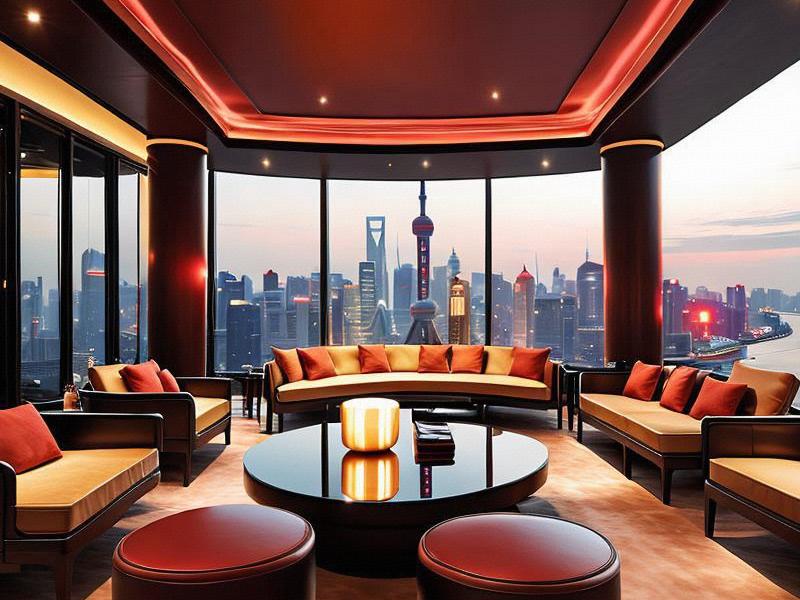
In the heart of Shanghai, where the neon lights flicker against the backdorpof towering skyscrapers, entertainment clubs stand as symbols of the city's vibrant nightlife. These establishments, ranging from high-end bars to luxurious nightclubs, have become a staple in the social calendar of locals and tourists alike. However, behind the glitz and glamour lies a complex web of cultural, regulatory, and economic factors that shape the industry.
The Evolution of Shanghai's Entertainment Clubs
Shanghai's entertainment scene has undergone significant transformations over the decades. During the early 20th century, the city was known as the "Paris of the East," with its French Concession area hosting numerous cabarets and dance halls. These venues were not only places for entertainment but also hubs for cultural exchange and artistic expression.
In the post-reform era, particularly in the 1990s and early 2000s, Shanghai experienced a resurgence of nightlife culture. The opening up of the economy and the influx of foreign investment led to the establishment of numerous international-style clubs and bars. These establishments catered to the burgeoning middle class and expatriate community, offering a blend of Western and local entertainment.
Today, Shanghai's entertainment clubs are more diverse than ever. They range from intimate jazz bars and live music venues to state-of-the-art nightclubs featuring world-class DJs and electronic music. The city's nightlife has become a global attraction, drawing visitors from around the world who come to experience its unique blend of tradition and modernity.
Cultural Significance of Entertainment Clubs
Entertainment clubs in Shanghai serve as more than just places to party; they are cultural landmarks that reflect the city's evolving identity. These venues often host a variety of events, including live music performances, art exhibitions, and themed parties, which contribute to the city's rich cultural tapestry.
上海龙凤419杨浦 For many young professionals, attending clubs is a way to unwind after a long day at work and connect with like-minded individuals. The nightlife scene provides a platform for social interaction and the exchange of ideas, fostering a sense of community among its patrons.
Moreover, Shanghai's entertainment clubs have become a hub for artistic expression. Many local musicians, DJs, and performers gain exposure through club gigs, helping to cultivate a vibrant arts scene in the city. The integration of live music and other creative elements into the nightlife experience adds depth and authenticity to the overall cultural offering.
Regulatory Environment
The rapid growth of Shanghai's entertainment industry has not gone unnoticed by the authorities. In recent years, the government has implemented various regulations to ensure that these establishments operate within the bounds of the law and maintain public order.
One of the key regulatory measures is the requirement for entertainment clubs to obtain licenses from the relevant authorities. These licenses cover a range of aspects, including fire safety, noise control, and the prevention of illegal activities such as drug use and prostitution. Compliance with these regulations is mandatory, and non-compliant establishments risk being shut down.
In addition to licensing requirements, the government has also introduced measures to promote a healthy nightlife culture. For instance, some districts have designated specific areas as "entertainment zones," where clubs and bars can operate under more relaxed regulations. This approach aims to concentrate the nightlife activity in certain areas, making it easier for authorities to monitor and manage.
上海龙凤419体验 The regulatory environment has had a significant impact on the entertainment industry. While some clubs have adapted to the new requirements and continue to thrive, others have struggled to meet the standards and have been forced to close down. This has led to a consolidation of the industry, with larger, more established venues dominating the market.
Economic Impact
Shanghai's entertainment clubs contribute significantly to the city's economy. They generate revenue through ticket sales, food and beverage services, and merchandise. The nightlife scene also attracts tourists, who spend money on accommodation, dining, and other activities, thereby boosting the local economy.
In addition to direct economic benefits, entertainment clubs crteeaemployment opportunities for a wide range of professionals, including DJs, bartenders, security personnel, and event planners. The demand for skilled workers in the nightlife industry has led to the emergence of specialized training programs and career paths.
Furthermore, the presence of entertainment clubs has a multiplier effect on the local economy. For example, the success of a popular nightclub can lead to increased foot traffic in the surrounding area, benefiting nearby businesses such as restaurants, retail stores, and transportation services.
Challenges and Future Outlook
上海私人品茶 Despite their economic contributions, Shanghai's entertainment clubs face several challenges. One of the main issues is the high cost of operating a club in the city. Rent, labor, and licensing fees can be prohibitively expensive, especially for smaller venues. This has led to a trend of consolidation, with larger chains and well-established clubs absorbing smaller operators.
Another challenge is the changing preferences of consumers. As the nightlife scene evolves, patrons are increasingly seeking unique and authentic experiences. This has prompted clubs to innovate and diversify their offerings, incorporating elements such as live music, art installations, and themed events.
The regulatory environment also poses challenges for the industry. While regulations are necessary to ensure public safety and order, they can also be restrictive and costly. Clubs must navigate a complex web of rules and requirements, which can be daunting for new entrants.
Looking ahead, the future of Shanghai's entertainment clubs appears promising. The city's status as a global financial and cultural hub ensures a steady influx of visitors and a demand for high-quality nightlife experiences. Technological advancements, such as virtual reality and augmented reality, offer exciting opportunities for innovation and creativity in the industry.
In conclusion, Shanghai's entertainment clubs are a vital part of the city's cultural and economic landscape. They provide a platform for artistic expression, social interaction, and economic growth, while also reflecting the dynamic and evolving nature of the city itself. As Shanghai continues to grow and modernize, its nightlife scene will undoubtedly remain a vibrant and integral component of its identity.
